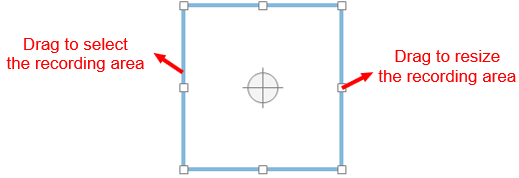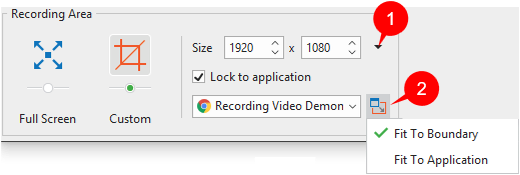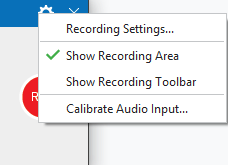Let’s say you want to create a video demo. Chances are you need to record your actions on screen and edit videos when finished. You may also wish to have other things in the video like your face and voice. In this case, the Record Video function in ActivePresenter 8 is the best choice for you. In this tutorial, I’ll show you steps to do that.
Kindly be noted that ActivePresenter also offers another recording mode called Record Software Simulation. It is different from Record Video. Many users are confusing about these two modes.
If you select Record Video, after recording, you will get a video. Otherwise, with the Record Software Simulation feature, it allows you to capture all actions on the screen and then convert them into a slide-based project including:
- Image slides (mouse click, key stroke);
- Video slides (mouse scroll, drag-n-drop).
In case your need is to create a software simulation, see Record Software Simulations.
Now is the time to learn about Record Video feature in detail. With ActivePresenter 8, recording video demonstrations is as simple as that!
To record a video demo, take five main steps below:
- Select Record Video
- Specify the Recording Area
- Set the Webcam and Audio
- Start the Recording
- Finish the Recording
As said earlier, there are 5 steps to record a video demo using ActivePresenter 8. In the rest of this article, I will walk you through all of them.
Step 1. Select Record Video
ActivePresenter 8 gives you two options to record video. First, create a new video demo as a new video project. Second, when you’ve already had a project, for example, a training course, and now you want to add a video demo to explain the steps, you can record video as a video slide.
If you go with the first option, do one of the following:
- Go to the Start Page > Record Video.
- Click the ActivePresenter button > Record Video.
If you select the second option, click the Home tab or the Insert tab > New Slide > Record Video. Alternatively, in the Home tab > Record Screen > Record Video.
After that, you will see:
- A blue rectangle and a cross-hair (in the middle of it) which indicate the recording area. ActivePresenter 8 will record actions that happen only inside this area. The rest of the screen doesn’t appear in your recorded video.

- A Record Video Project dialog. There are many things which can be done from here. For example, specify the recording area or open the Settings menu.
- A Recording Toolbar. This toolbar will appear if you early select to show it (by clicking the gear icon in the Record Video Project dialog). Normally, it isn’t shown by default. I’ll discuss this toolbar later.

Now you’ve got the basic information about the Record Video function, let’s move to step 2.
Step 2. Specify the Recording Area
ActivePresenter gives you two ways to specify the recording area. One is using the blue rectangle to do that manually. But if you want to have more options, just work with the Recording Area section in the Record Video Project dialog.
In the Record Video Project dialog, the Recording Area section is a useful feature. The name says it all. That is, this section offers two capture modes: Full Screen and Custom. Choose one of them to specify the capture area.

The Full Screen mode is good to go with if you want to capture the entire screen. By doing so, the entire screen will be treated as the capture area.
The Custom mode gives you the ability to record a partial screen. This mode also comes with which will please you, for sure.
- Enter the width and height value in the Size spin boxes. Or, click the Preset Sizes drop-down list (1) to select a preset from the list.
- Select Lock to application check box to fit the blue rectangle to the size of a specific application window. Then, no matter how you move or resize the target window, the recording area will follow. Thanks to that, users don’t need to manually resize it.
- Click the Change Lock Mode button (2) to show two other options. The Fit To Boundary command resizes the application window to fit into the blue rectangle. On the contrary, the Fit To Application option resizes the blue rectangle to fit into the application window.
Step 3. Set the Webcam and Audio
In this step, I will show you how to record webcam and audio with ActivePresenter 8. Using them is perfect for personalizing your video demo.
To set the webcam and audio, take a look at the Audio & Webcam section in the Record Video Project dialog. As you notice, the section has two commands. One is for recording webcam, and the other is for recording audio. You can select one of them or both.

- Webcam: Click the Webcam button to enable/disable the webcam recording. When the webcam is on, which allows you to have your face in the recorded video, the camera icon turns green. Then, a live preview of the camera appears next to the button. You can click the drop-down arrow next to the button to choose a detected webcam device from the list. For more information, please check: How to Record Webcam.
- Audio: Click the Audio button to turn on/off this recording option. When the icon is green, that means the audio recording function has been enabled. When you click on the drop-down arrow next to the button, this feature comes with two commands to capture audio system and audio from microphone. In case of the latter, select one from the microphones detected to record. In addition, there is a volume scale next to the Audio command. Drag it to change the recording volume if you want. For more details, you can refer to: How to Record Audio from Microphone and System Audio.
Note:
The Record Video Project dialog contains a Settings menu as well. To access this menu, click the Settings button in the top-right corner of this dialog.

The Settings menu has four following options:
- Recording Settings…: Open the Recording Settings dialog for more recording options.
- Show Recording Area: Show or hide the blue rectangle.
- Show Recording Toolbar: Show or hide the Recording Toolbar.
- Calibrate Audio Input…: Click to open the Calibrate Audio Input dialog. It’s a functional feature to detect recording sensitivity levels and improve the sound quality when creating video demonstrations. From this dialog, you can change the audio input volume automatically or manually.
Step 4. Start the Recording
To start recording, click the Record button, and then the countdown appears. The app will start recording after the countdown.
At the same time, an ActivePresenter icon is also shown in the system tray. Click this icon to show the Recording Toolbar allowing you to stop recording and view the recording status.

- Statistics section: Give you information about the recording. That is, Mode is the current recording project mode (Video for the Record Video function). Frames are the current frame number of the recording. Meanwhile, Dropped indicates the number of missed frames of the recorded video.
- Duration section: Show the current duration of the recording.
- Audio section: Show the audio sound level.
- Webcam section: Show the live preview of webcam.
To hide any section as shown above, click the Settings button (3) to show the options. Then, unselect the section you don’t want to show.
Tip: When recording a partial screen, you can show the Recording Toolbar to view the statistic and easily pause or stop recording. Besides, it’s useful to display the webcam to get a live preview of yourself. Also, make sure you place this toolbar outside the blue rectangle or it will appear in the recorded video.
Step 5. Finish the Recording
To stop the recording, press CTRL and END (for Windows) or ⌥⌘2 (for macOS). Then, the app moves you to the editor immediately. Your newly recorded video which includes all actions you’ve taken is right before your eyes. In this editor, you’re free to edit the video demo the way you want. So, you’re free to unlock your creativity!
You can take a look at this tutorial: How to Start and Stop Recording to see more details.
After that, once finishing the capturing phase, ActivePresenter automatically transfers your recording to the edit screen. You are enabled to fine-tune and enrich your recorded videos right within ActivePresenter with a lot of powerful features. Check out Edit Recorded Videos tutorial to learn more.
Finally, if you wish to export the video demo, go to the Export tab and click Video.
So, don’t wait anymore! Work with ActivePresenter 8 right now to record your first video demonstration. In case you have any questions, let us know. We’re ready to support you. Also, check out our How to Record Webcam and How to Record Audio from Microphone and System Audio in ActivePresenter 8 tutorials for more options when you record your screen.
More articles you may want to know:
